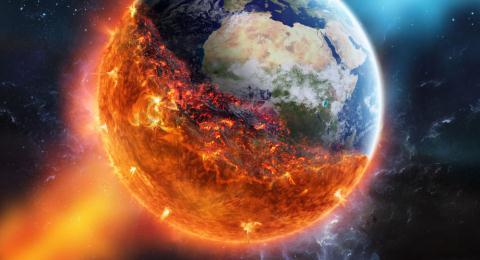The detailed consequences we may face as the Earth continues to warm
When the Earth warms excessively, or climate change, it will cause a series of negative impacts on the environment, ecosystems, and people. Here are the detailed consequences we may face as the Earth continues to warm:
1. Global Temperature Increase
a. Extreme climate change
- Higher temperatures: Rising global temperatures lead to longer and more frequent heat waves, which are harmful to human health, especially the elderly, children, and people with underlying medical conditions.
- Extreme weather: Extreme weather events such as storms, floods, droughts, and floods will become more common and severe, causing damage to property and lives.
b. Sea level rise
- Melting ice and glaciers: The melting of ice and glaciers at the poles and alpine areas raises sea levels, threatening lowlands and small islands.
- Coastal flooding: Coastal cities and densely populated areas can be flooded, causing population displacement and major economic losses.
2. Impact on the ecosystem
a. Loss of habitat
- Loss of forests and biodiversity: Rainforests and other ecosystems can be degraded or disappear, causing the extinction of many species of animals and plants.
- Coral reefs: Warming sea water and ocean acidification can cause coral reef bleaching, threatening the life of marine organisms.
b. Effects on animals
- Migration and extinction: Many animals will have to migrate in search of new habitats, but not all species will be able to adapt in time, leading to the risk of extinction.
3. Impact on Agriculture and Food Sources
a. Decrease in agricultural output
- Droughts and floods: Climate change causes droughts and floods, affecting crop yields and causing food shortages.
- Seasonal changes: Changes in the timing and conditions of crops can disrupt the planting and harvesting cycles, affecting agricultural production.
b. Food Security
- Food Shortages: Reduced agricultural production leads to food shortages, causing hunger and malnutrition, especially in poor and vulnerable areas.
4. Affects human health
a. Diseases
- Tropical diseases: Rising temperatures and climate change can expand the distribution range of tropical diseases such as malaria, dengue fever, and Lyme disease.
- Air quality: Increased air pollution and fine particulate matter (PM2.5) can cause respiratory and cardiovascular diseases.
b. Psychological Health
- Stress and anxiety: Extreme weather events and property loss can cause stress, anxiety, and other psychological health problems.
5. Economic and Social Impact
a. Economic Losses
- Property Damage: Floods, droughts, and extreme weather events cause major damage to property and infrastructure.
- Reduced labor productivity: High temperatures and harsh working conditions reduce labor productivity, affecting the economy.
b. Conflict and migration
- Environmental migration: Many people will have to migrate due to the loss of land and habitats, causing conflict and pressure on migratory host areas.
- Resource conflicts: Competition for resources such as water and food can lead to conflict and social unrest.
Conclude
Climate change and global warming are urgent issues that require urgent action from the international community. Without effective mitigation and adaptation measures, we will face serious and long-term consequences. Investing in sustainable solutions, reducing carbon emissions, and protecting the environment is necessary to ensure a safe and sustainable future for all.


Đăng bình luận